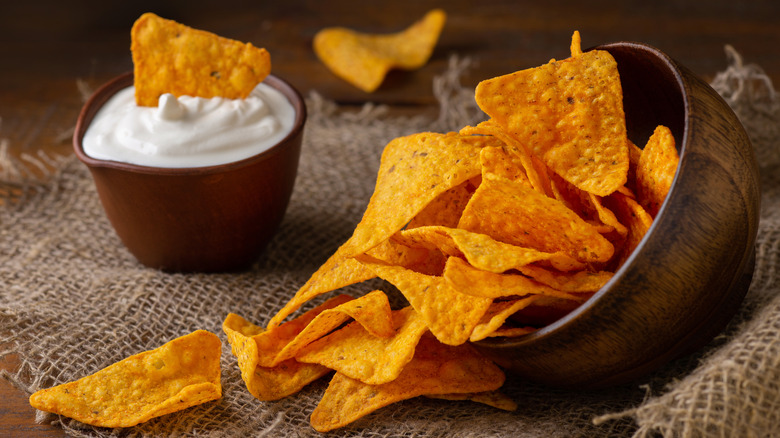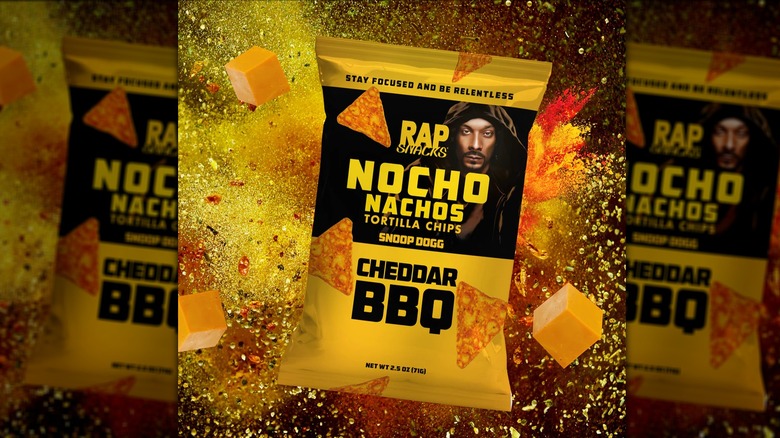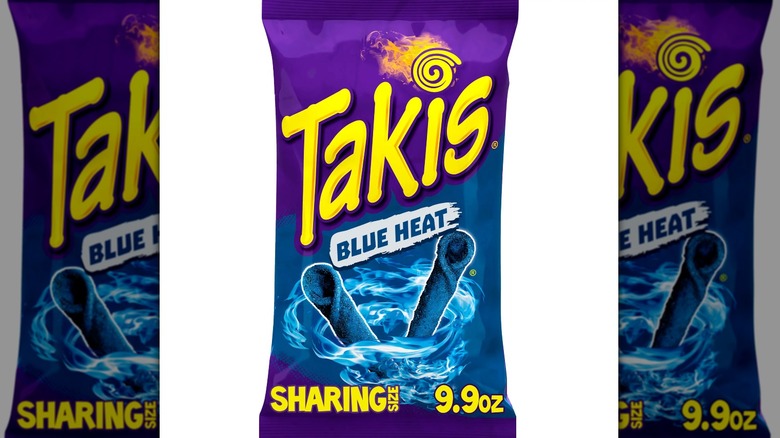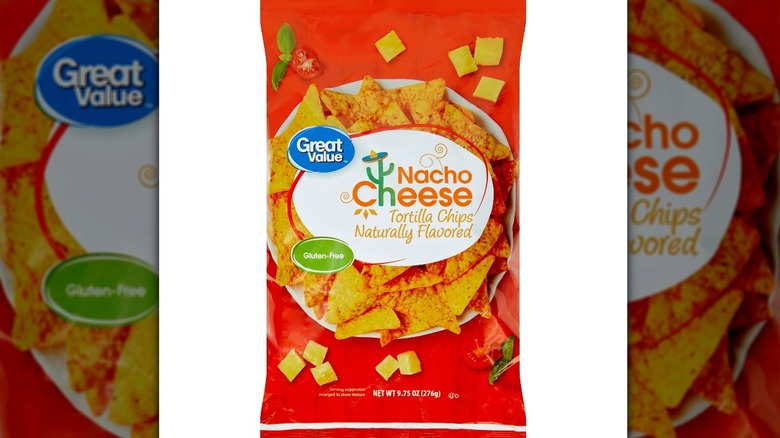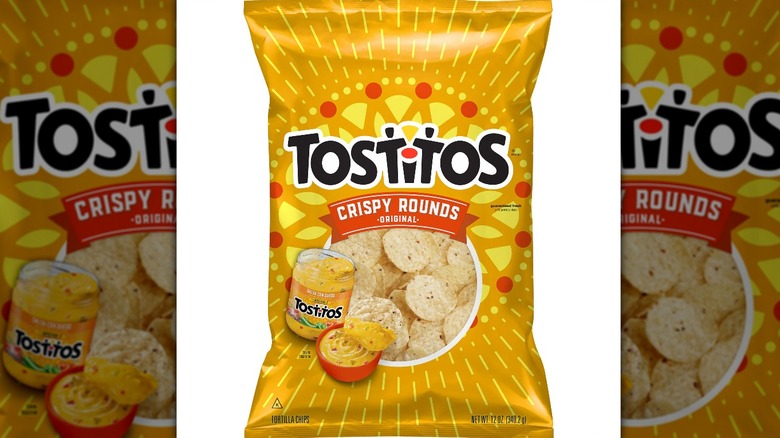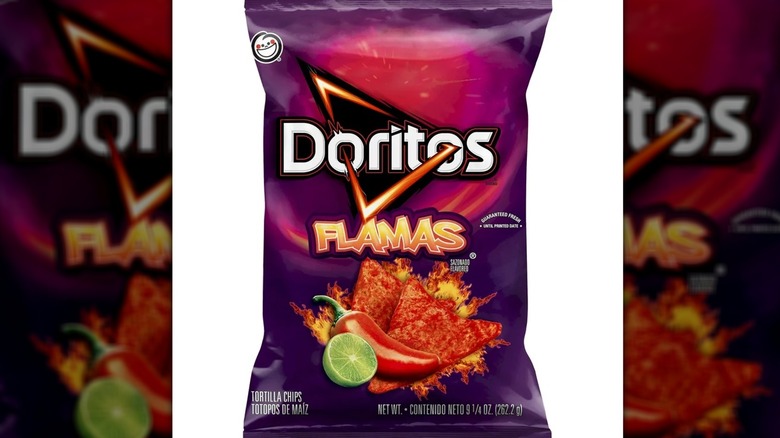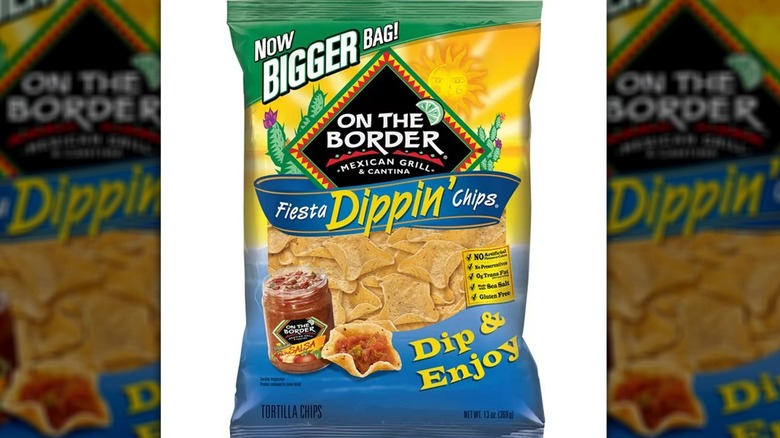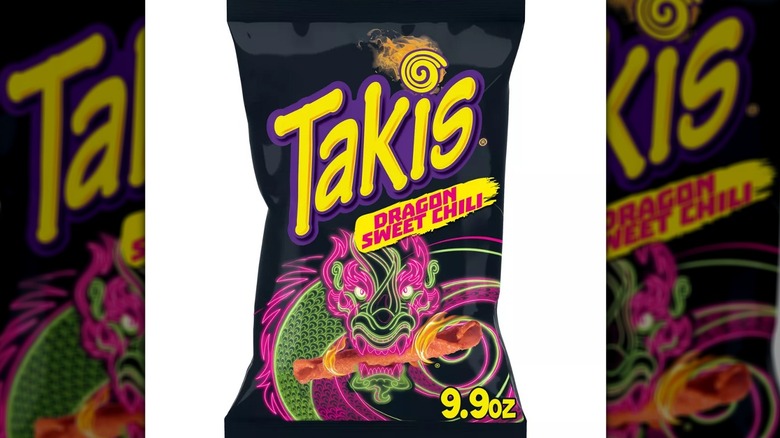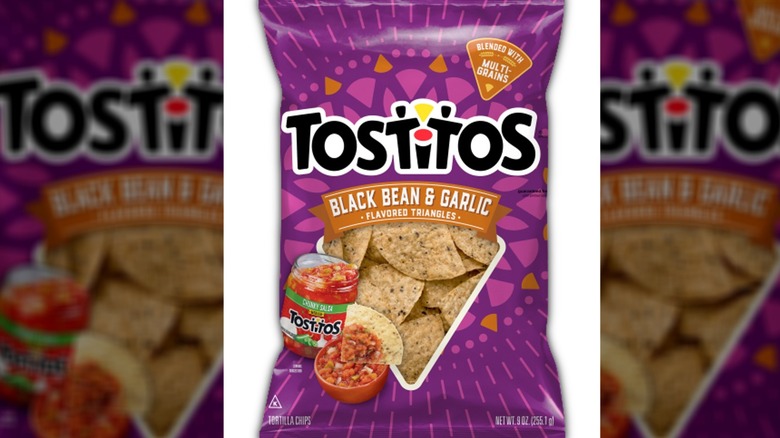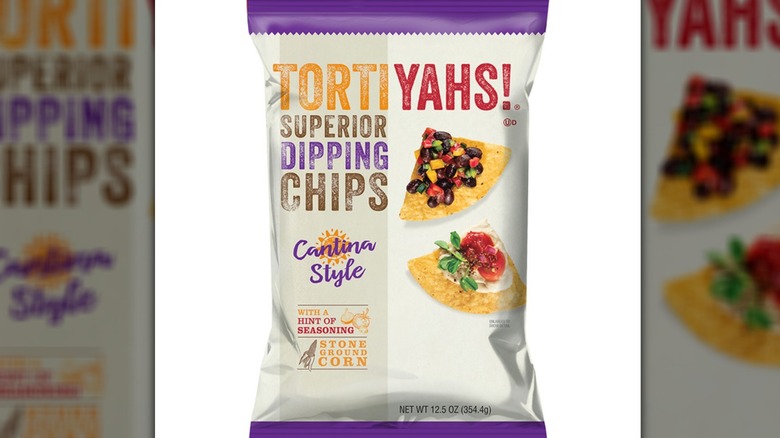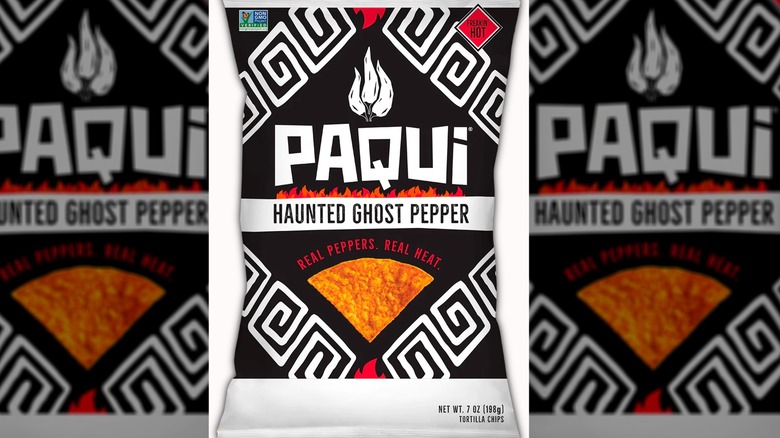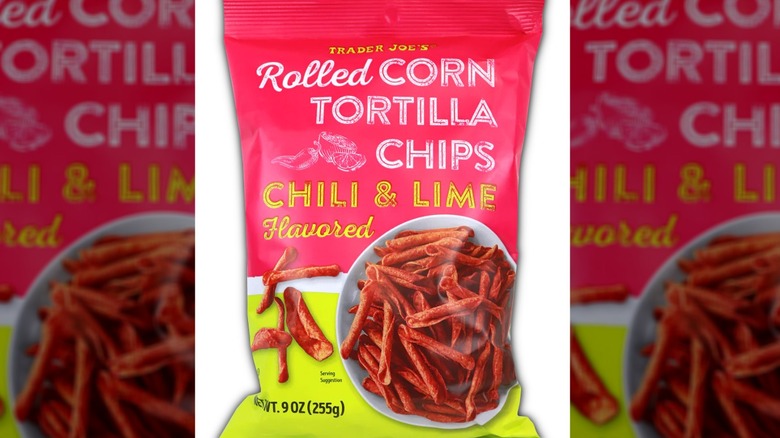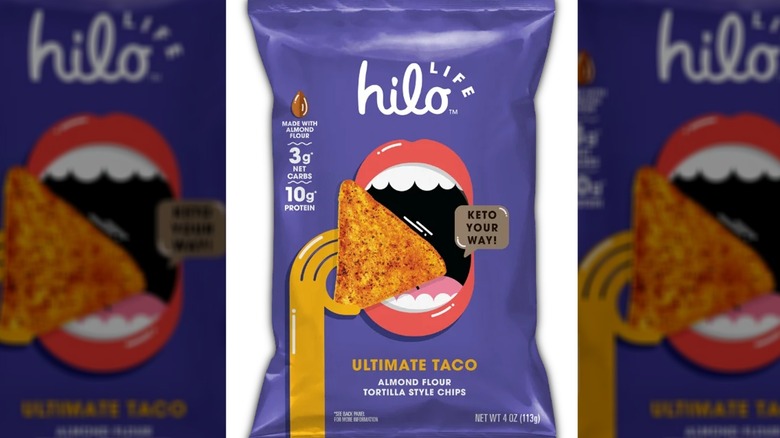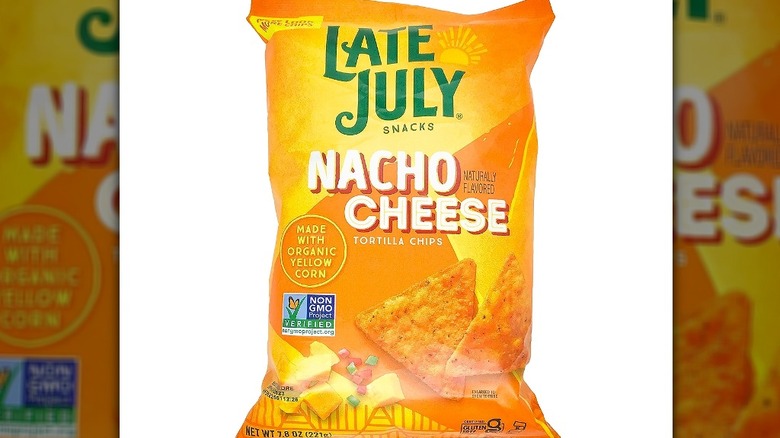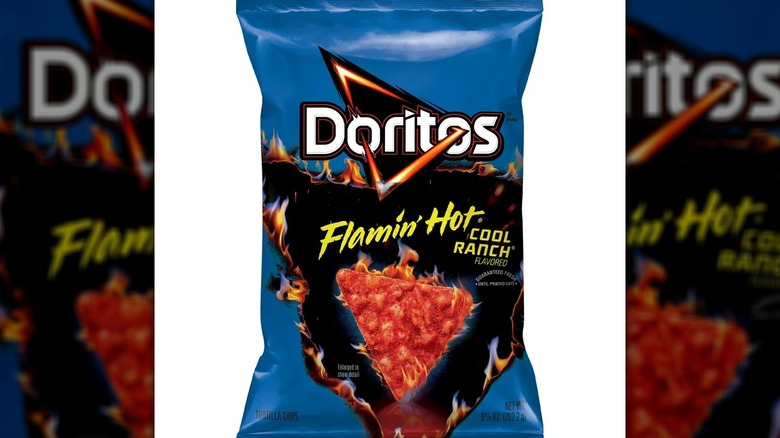The 15 Unhealthiest Store-Bought Tortilla Chips
We may receive a commission on purchases made from links.
Tortilla chips have secured a top spot in the hearts (and pantries) of many. Whether accompanying a bowl of salsa, enhancing a cheesy nacho platter, or simply enjoyed on their own, these corn-based delights have become the life of the party or our best friend in a Netflix marathon. With their widespread popularity, they have become easily accessible in stores and available in a myriad of brands, flavors, and compositions. However, the nutritional quality of tortilla chips can vary significantly depending on their composition and preparation.
Some chips may be fried in oils that contain higher levels of saturated and trans fats, which are considered harmful to cardiovascular health. The seasoning blends found in some chips can add extra sodium and artificial flavors. Chemicals like monosodium glutamate (MSG) and various preservatives are often used to enhance taste and extend shelf life. Lastly, some tortilla chips may contain added (hidden) sugars in their seasoning and flavor mixtures. When grabbing a bag of tortilla chips next time, here are a few plain and flavored brands you might want to avoid.
1. Rap Snacks Snoop Dogg Cheddar BBQ Nocho Nachos
A bag of Rap Snacks Snoop Dogg Cheddar BBQ Nocho Nachos contains 6 grams of saturated fat (28% daily value) and 620 milligrams of sodium (27% daily value), along with 39 grams of total carbohydrates (14% daily value). Additionally, the snack contains artificial colorings, including FD&C Yellow #5 and Yellow #6, adding concerns about its quality. The use of processed vegetable oils in the snack prompts scrutiny regarding the potential inclusion of unhealthy trans fats. Furthermore, the inclusion of bioengineered food ingredients also warrants consideration about the use of genetically modified organisms (GMOs) and their potential negative health impacts.
Saturated fats can negatively impact your health in multiple ways, raising the risk of heart disease due to increased LDL cholesterol according to insights from MedlinePlus. Excessive sodium intake can lead to high blood pressure, heart disease, and stroke, according to the Harvard T.H. Chan School of Public Health. The human body requires a modest amount of sodium for supporting muscle functions, maintaining the proper balance of water and minerals, and assisting nerve impulses. The optimal daily sodium intake for mitigating chronic diseases is 2,300 milligrams. Regrettably, the majority of Americans surpass this limit, averaging around 3,400 milligrams per day.
2. Takis Blue Heat
Takis Blue Heat chips are considered unhealthy for several reasons. Firstly, they contain high levels of total fat (8 grams per serving) and saturated fat (2 grams per serving), which can potentially increase the risk of heart-related issues per WebMD. Additionally, the chips are loaded with sodium (180 milligrams per serving), which can also increase risk of hypertension and other cardiovascular problems. Note that the nutritional information mentioned on the packaging is based on a single serving size of approximately 12 chips. A standard container of Takis Blue Heat contains 10 servings, enlarging the bag of chips' potential health impact when consumed as a whole.
In the list of ingredients, we've found MSG listed as a flavor enhancer, among other components. While MSG is generally recognized as safe by regulatory authorities, some individuals may be sensitive to it and experience adverse reactions like headaches, nausea, or sweating as explained by Mayo Clinic.
Obviously, the biggest elephant in the room here is the blue color. While the use of Blue 1 Lake as a food coloring agent in the chips may not have immediate and direct health impacts, it's essential to note that this artificial color is derived from chemicals to achieve the blue hue, as seen in Cosmetics Info. Consumers concerned about artificial food colorings may prefer naturally occurring colors for more health-conscious choices.
3. Great Value Nacho Cheese Tortilla Chips
Great Value's Nacho Cheese tortilla chips contain a high amount of total fat, coming in at 7 grams per serving and saturated fat, with 1 gram per serving, which can lead to increased body fat and heightened risk of heart-related concerns. Additionally, the chips have a substantial sodium content (200 milligrams per serving), which also contributes to increased cardiovascular health risks. One serving is approximately 1 ounce, or about 15 chips, and a standard 9.75-ounce container of these chips contains about 10 servings in total.
The chips are filled with additives like MSG and artificial colors (e.g., Yellow 6 Lake, Red 40 Lake), and flavorings, which offer little to no nutritional value and may lead to adverse reactions in sensitive individuals. While these chips do supply minor amounts of calcium (2% of the recommended daily intake) and iron (2% of the recommended daily intake), the absence of other essential nutrients like potassium and vitamin D speaks volumes about their overall nutritional value.
4. Tostitos Crispy Rounds Tortilla Chips
Tostitos Crispy Rounds contains 7 grams of total fat per serving, contributing 9% of the recommended daily intake among which, 1 gram of saturated fat per serving (5% of the recommended daily intake) plays a part. As an essential macronutrient, fat plays a vital role in bodily functions. However, as voiced by WHO, excessive fat consumption from less healthy sources may potentially increase the risk of obesity, heart-related issues, and even cancer. The chips also carry a moderate sodium of 115 milligrams per serving, making up 5% of the recommended daily intake. While not excessively high, regular consumption of salty snacks like these can add up and potentially lead to health issues. The nutrition facts provided are taken from a 12-ounce bag, with a serving size of 28 grams or about 13 chips. The bag contains 12 servings in total.
While it may take some self-control to stop at just 13 chips and limit potential damage, it's equally important to take into account other nutritional aspects. This snack provides minimal amounts of calcium, potassium, iron, and vitamin D (all 0% of the recommended daily intake), which further highlights its limited nutritional value. As a result, these chips should not be regularly consumed as a substantial part of one's diet.
5. Doritos Flamas Flavored Tortilla Chips
Doritos Flamas are considered unhealthy due to several factors. Firstly, each serving from the 9 1/4-ounce bag contains 8 grams of total fat, making up 10% of the recommended daily intake. The chips contain 1 gram of saturated fat per serving, representing 5% of the recommended daily intake. The chips also have a sodium content of 200mg per serving, contributing to 9% of the recommended daily intake. The serving size is 28 grams, equivalent to about 12 chips, and there are nine servings per container.
Upon closer examination of the ingredients, we've identified some concerning components, such as MSG as a flavor enhancer, Red 40 Lake, and Yellow 6 Lake as artificial colors. The presence of hydrolyzed corn protein raises concerns as it is a hidden form of MSG, as reported by CBC News. For individuals with lactose intolerance or dairy allergies, whey and whey protein concentrate may trigger reactions.
The absence of specific chili-based ingredients, such as chili powder, in the provided list raises a question: How are they achieving the "flamas" or fiery hot flavor as depicted on the packaging? Are there hidden ingredients that contribute to the spiciness? While the ingredients list does include various seasonings and flavorings like citric acid, garlic powder, and onion powder, it does not explicitly reveal the source of the fiery kick.
6. On the Border Fiesta Dippin' Chips
On the Border Fiesta Dippin' Chips may appear to have positive features, being gluten-free, free from artificial colors, flavors, and MSG, and using sea salt as a seasoning. However, a closer look reveals unhealthy aspects. Each serving of these chips contains 9 grams of total fat, including 1 gram of saturated fat (5% of the recommended daily intake). Additionally, the chips are relatively high in sodium, with 115 milligrams per serving (5% of the recommended daily intake). The nutritional data is based on a serving size of approximately 1 ounce or about 13 chips, with 12 servings per 12-ounce bag.
These chips lack dietary fiber, a crucial nutrient for digestive health and blood sugar level control as emphasized by the CDC. Additionally, they only provide minimal amounts of essential nutrients like calcium, potassium, iron, and vitamin D (all 2% or less of the recommended daily intake), underscoring their limited nutritional value. Moreover, we also found the usage of vegetable oils, such as canola, corn, cottonseed, safflower, and/or soybean oil, which Healthline highlights as concerning due to their higher omega-6 fatty acid content. This is especially important since the Western diet contains an overabundance of omega-6 fatty acids compared to omega-3s, leading to inflammation and other health issues.
7. Takis Dragon Sweet Chili
Takis Dragon Sweet Chili Rolls prove to be an unhealthy snack for several reasons, as indicated by the nutrition facts per 90-gram bag. Each bag contains a substantial amount of total fat (25 grams), which accounts for 33% of the recommended daily intake. Additionally, the rolls provide 4 grams of saturated fat per bag (21% of the recommended daily intake). Despite a relatively low trans fat content at 0.2 grams, consumption should be limited due to its widely known adverse health effects. What's more concerning is that consuming just one bag of these chips fulfills at least a fifth of the recommended daily intake for both total fat and saturated fat, and this doesn't even take into account anything else eaten during the day.
The FDA sets 2,000 calories as the daily value guidance for calorie intake to help manage healthy weight and avoid diseases caused by imbalanced diet. A 90-gram bag of Takis Dragon Sweet Chilli contains 470 calories, making it a calorie-dense snack that provides well over 20% of the FDA's recommended daily intake. This significant caloric load comes solely from a snack and takes away room for other healthy nutrients, limiting balanced intake.
Lastly, the seasoning includes artificial flavors, sugar, and a combination of food colorings like Allura Red and Sunset Yellow FCF. While these colorings may enhance the visual appeal of the rolls, they add no nutritional benefit and are best avoided because they are chemically made.
8. Tostitos Rounds Black Bean & Garlic
When assessing the nutritional profile of Tostitos Black Bean & Garlic, several elements stand out. At 150 calories for roughly eight chips, one might easily consume multiple servings in a single sitting without realizing it. Indulging in excessive chips can rapidly rack up calories, preventing you maintaining a balanced diet. Fat contributes the most calories per gram when compared to carbohydrates and proteins. The chips derive 42% of their calories from fat. While fat isn't inherently bad, the type and source matter. Here, the sources are vegetable oils, which might contain a mixture of unsaturated and saturated fats. Although the saturated fat content is relatively low, the type of fat in vegetable oils can vary, and some types, like omega-6 fatty acids, might contribute to inflammation when consumed in excess.
Maltodextrin is a carbohydrate derived from corn and is often used as a filler or thickener. Per Healthline, It has a high glycemic index, which means it can rapidly spike blood sugar levels. Frequent consumption of high glycemic foods can lead to insulin resistance and potentially type 2 diabetes.
The term "natural flavors" used in the ingredients list is quite vague. It refers to flavors derived from natural sources but might undergo extensive processing. It doesn't provide much information about what it specifically contains or how it might impact health and for this reason, it's best to limit or completely avoid consumption of this snack.
9. TORTIYAHS! Cantina Style Tortilla Chips
At 140 calories per 1-ounce serving, Tortiyahs! Cantina Style Superior Dipping Chips may not sound like much. The overall caloric intake for a standard 12.5-ounce bag, however, could pile up quickly if the whole bag is consumed in unrestrained indulgence.
The chips contain 8 grams of fat per serving, including 2 grams of saturated fat, which represents 10% of the recommended daily value. Among the oils listed (corn, cottonseed, sunflower, canola), cottonseed oil stands out for its high omega-6 fatty acid content, which can be pro-inflammatory when not balanced with sufficient omega-3s. Additionally, the chips contain 2 grams of saturated fat per serving, representing 10% of the recommended daily value.
At 180mg of sodium per serving, the chips are relatively high in salt. High sodium intake can lead to increased blood pressure and risk of cardiovascular diseases. The carbohydrate content is primarily from corn flour, which might cause a quick rise in blood sugar levels. The fiber content is relatively low at 1 gram per serving. Given that they are made primarily from corn flour, one might hope for higher fiber content for improved satiety and digestive health benefits. Since the product is made on shared equipment with products containing milk, those with severe dairy allergies or sensitivities may want to avoid this product.
10. Paqui Haunted Ghost Pepper Tortilla Chips
At 140 calories for about 10 chips, the caloric content in Paqui Haunted Ghost Pepper is in line with many processed snacks. The chips contain 7 grams of fat per serving. Per the FDA, at has more than twice the calories per gram as carbohydrates and protein, so it contributes significantly to the calorie content. The chips use expeller-pressed canola or sunflower oil. While these oils are better than some alternatives, as they contain unsaturated fats, their nutritional value is subject to the way they are processed. Expeller-pressed is generally a better method than chemical extraction, but it can still involve heat, which might degrade the oil. With a relatively low 1 gram of saturated fat per serving, repeated consumption can still add up to daily intake limits.
With 210 milligrams of sodium per serving, the chips are notably high in salt. Excessive sodium consumption has been associated with reduction in kidney function per Healthline.
At 18 grams per serving, carbs make up a significant portion of the chip's nutritional profile. Since these are mainly from ground corn, they're primarily simple carbohydrates that could lead to rapid spikes in blood sugar. Dietary fiber is present only at 1 gram per serving, a low amount considering they're made from corn. Fiber helps with digestive health and satiety. Even though there's no added sugars, the inclusion of cane sugar in the ingredient list implies some level of sugar, albeit minor.
11. Trader Joe's Chili & Lime Flavored Rolled Corn Tortilla Chips
When evaluating the nutritional profile and ingredient list of Trader Joe's Chili & Lime Flavored Rolled Corn Tortilla Chips, several factors stand out. At 150 calories for about 15 chips, this is typical for most tortilla chips. However, like other snacks, it's easy to eat multiple servings without realizing it, especially if one isn't measuring out servings.
The chips contain 8 grams of fat per serving, largely from the vegetable oils used in their production. The oils listed (high-oleic sunflower oil, high-oleic safflower oil, and canola oil) are primarily monounsaturated fats, which are generally considered heart-healthy per MedlinePlus. However, the overall processing and heating of these oils during chip production could impact their nutritional quality. These chips are notably high in salt with 260 milligrams per serving.
When it comes to carbs, 17g per serving is typical for tortilla chips, and the majority of the carbs come from stone-ground yellow corn. Even though there are no added sugars, cane sugar and lime juice concentrate (which is marked as an added sugar) are present in the ingredient list.
12. Hilo Life ULTIMATE TACO
Hilo Life Ultimate Taco chips offer 150 calories per serving of approximately 14 chips. While this may appear standard for a snack, it might add up quickly for those enjoying more than one serving at a time, contributing to excessive calorie intake. A closer look at the fat content reveals that these chips contain 11 grams of fat per serving. While some of the fat is attributed to heart-healthy monounsaturated sources, the total quantity is on the higher end compared to many other chips on the market. This may be a concern for those watching their overall fat consumption.
The sodium content in these chips stands at 210mg per serving, an amount that could be considered high. For individuals concerned with their sodium intake, especially those monitoring their blood pressure, this level of sodium might be problematic. The taco seasoning in Hilo Life Ultimate Taco chips comprises several ingredients, including natural flavors, yeast, onion powder, tomato powder, yeast extract, garlic powder, sunflower oil, paprika extract, acacia gum, among others. The term "natural flavors" is somewhat nebulous and can encompass a wide array of ingredients.
Lastly, the presence of milk and almonds in the ingredients might pose a risk for those with allergies to these substances. While this may not be a concern for the general population, for those with specific food allergies, this is a critical aspect to be aware of when considering these chips as a snacking option.
13. Garden of Eatin' Wicked Hot Tortilla Chips
The Garden of Eatin' Wicked Hot Tortilla Chips, in its 5.5-ounce offering, touts several nutritional markers that should catch the attention of health-conscious consumers. Each serving delivers 7g of total fat, accounting for 9% of the suggested daily value. Though this doesn't stand out as excessive at first glance, coupled with other meals and snacks during the day, it could add up.
The chips contain dextrose, a simple sugar form, and maltodextrin, a carbohydrate culled from starch. The latter – particularly when derived from corn — is notorious for its rapid impact on blood sugar levels; however the presence of dextrose indicates there are additional sugars, possibly in amounts small enough to round down to 0 grams on nutritional labels, but present nonetheless. Additionally, with dairy components like cultured buttermilk powder and cheddar cheese introduced into the mix, lactose-intolerant individuals or those allergic to dairy proteins are advised to tread carefully. This dairy content is explicitly highlighted under the product's allergen information, signaling "milk and dairy" as primary allergenic concerns.
14. Late July Organic Nacho Cheese Tortilla Chips
The Organic Nacho Cheese Tortilla Chips, while presenting under an organic banner, have specific nutritional and ingredient facets warranting a closer look. Starting with the fats, the chips provide 7 grams of total fat per serving, which is 9% of the daily value. Of this, 0.5 gram is saturated fat. The presence of 1 gram of polyunsaturated and 4.5 grams of monounsaturated fats provides some relief, given that these are typically viewed as healthier fats. Still, the source of these fats is essential. The chips utilize sunflower or safflower oil, which are predominantly high in omega-6 fatty acids.
Sodium is another aspect to be considered at 120 milligrams per serving. On the carbohydrate front, each serving packs 18 grams of carbs, 2 grams of which are dietary fiber, and 1 gram as sugars. The modest sugar content is a minor concern, but the type of carbohydrate and its potential glycemic impact might matter to some consumers, especially those with specific dietary conditions.
Delving into the ingredients, we found whey. Whey is a milk byproduct, often used in food processing for its flavor-enhancing properties. However, it could be problematic for lactose-intolerant individuals. Yeast extract, a recurrent additive in many processed foods, is rich in free glutamates – a compound similar in effect to MSG.
15. Doritos Flamin' Hot Cool Ranch
Doritos, known for its array of bold flavors, introduces the Flamin' Hot Cool Ranch flavor in a 9.25-ounce package. Examining the nutrition and ingredients offers insights into areas of potential health concern. The chips contain 8 grams of total fat per serving, accounting for 10% of the daily value. The saturated fat content sits at 1 gram, contributing 6% of the daily value. While moderate, it's the source of these fats that's pivotal. The chips use a mix of vegetable oils including corn, canola, and sunflower.These oils are typically higher in omega-6 fatty acids, and an imbalance with omega-3s can be a nutritional consideration.
Sodium, at 190 milligrams per serving or 8% of the daily value, can accumulate when combined with other salty foods throughout the day. Carbohydrates are present at 18 grams per serving, with only 1 gram as dietary fiber. The low fiber content means most of the carbs are fast-digesting, which could have a more pronounced effect on blood sugar levels per Harvard T.H. Chan School of Public Health. The ingredient list shows the inclusion of monosodium glutamate (MSG) as a flavor enhancer, often associated with adverse reactions in sensitive individuals.
